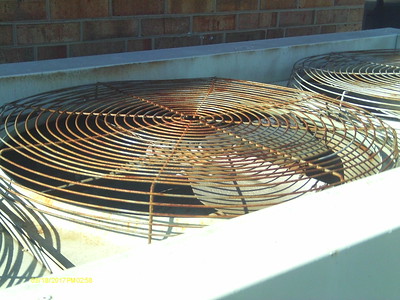Right now, there’s not a lot of good information to answer questions about coronavirus spread. Is it spread by coughing and sneezing? If so, how is it that so many asymptomatic people – those who aren’t coughing and sneezing – are spreading the virus? Is it spread by surface transmission? How does the virus behave in the air? How long is it viable? Are non-medical masks effective at containing coronavirus spread? Knowing how the virus spreads could help reduce its ability to infect people.
New evidence supports the idea that contact in closed spaces promotes coronavirus spread. Additionally, experimental evidence suggests that recirculating air in buildings increases coronavirus spread. Exchanging air with the outside decreases it.
I wrote yesterday about WCC’s current air handlers. In most buildings, these units are in bad shape. Running old equipment is not good from an efficiency standpoint. It’s also bad for reliability. One of the probable keys to making public buildings safer is to introduce more outside air.
New air handling units could check coronavirus spread
Sadly, most campus buildings don’t have operable windows. The only way to put more outside air in them is to retune the HVAC systems or mechanically move outside air inside. Unfortunately, “outside air” is the sworn enemy of energy efficiency, and WCC already spends a lot on energy. In fact, it spends more on energy than any other community college in Michigan.
This is partly because the air handling units at WCC are very old. In fact, they’re end-of-life or beyond end-of-life.
Being end-of-life is adequate justification for spending $330,000 on new Wi-Fi network for the campus. It is apparently not adequate justification for spending money on new HVAC systems.
New HVAC systems could pay for themselves by reducing WCC’s energy expenditures. They could reduce WCC’s carbon footprint. They could also help control the spread of a pandemic respiratory illness with no known cure, no effective treatments, and no vaccines.
The new Wi-Fi system will never pay for itself. Ridiculously, somehow it scoots up to the top of the priority list, as a life-and-safety issue no less. Meanwhile WCC’s ancient, inefficient HVAC systems – which can actually kill you – wheeze along, year after year. In fact, they’ve taken up permanent residence on the “Neglected Maintenance” list.
Leadership on this issue is not forthcoming from the Administration. The Trustees don’t seem fazed in the least by WCC’s enormous heating and cooling costs. (They’ve done their good deed for the month by replacing the Killer Wi-Fi network.) And now, thanks to the pandemic, these HVAC dinosaurs could be helping coronavirus spread on campus.
Photo Credit: FanFan61618, via Flickr
















